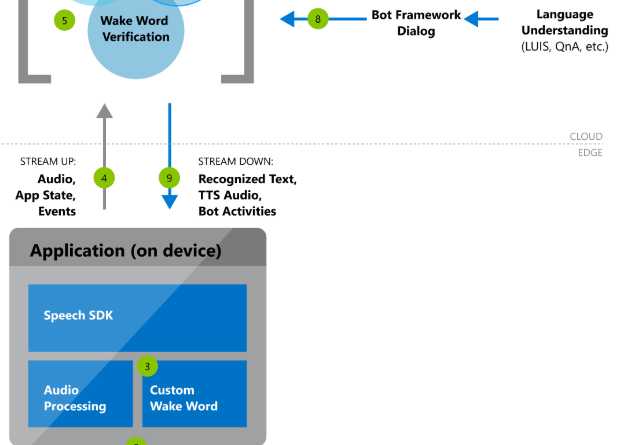Conversational AI updates for July 2019
At Build, we highlighted a few customers who are building conversational experiences using the Bot Framework to transform their customer experiences. For example, BMW discussed its work on the BMW Intelligent Personal Assistant to deliver conversational experiences across multiple canvases by leveraging the Bot Framework and Cognitive Services. LaLiga built their own virtual assistant which allows fans to experience and interact with LaLiga across multiple platforms.
With the Bot Framework release in July, we are happy to share new releases of Bot Framework SDK 4.5 and preview of 4.6, updates to our developer tools, and new channels in Azure Bot Service. We’ll use the opportunity to provide additional updates for the Conversational AI releases from Microsoft.
Bot Framework channels
We continue to expend channels support and functionality for Bot Framework and Azure Bot Service.
Voice-first bot applications: Direct Line Speech preview
The Microsoft Bot Framework lets you connect with your users wherever your users are. We offer thirteen supported channels, including popular messaging apps like Skype, Microsoft Teams, Slack, Facebook Messenger, Telegram, Kik, as well as a growing number of community adapters.
Today, we are happy to share the preview of Direct Line Speech channel. This is a new channel designed for voice-first experiences for your Bot Framework utilizing Microsoft’s Speech Services technologies. he Direct Line Speech channel is a native implementation of speech for mobile applications and IoT devices, with support for Text-to-speech, Speech-to-text, and custom wake words. We’re happy to share that we’re now opening the preview to all Bot Framework customers.
Getting started with voice support to your bot is easy. Simply update to the latest Bot Framework SDK, configure the Direct Line Speech channel for your bot, and use the Speech SDK to embed voice into your mobile application or device today.
Better isolation for your bot: Direct Line App Service Extension
Direct Line and Webchat are used broadly by Bot Framework customers to provide chat experiences on their web pages, mobile apps, and devices. For some scenarios, customers have given us the feedback that they’d like a version of Direct Line that can be deployed in isolation, such as in a Virtual Network (VNET). A VNET lets you create your own private space in Azure and is crucial to your cloud network as it offers isolation, segmentation, and other key benefits. The Direct Line App Service Extension can be deployed as part of a VNET, allowing IT administrators to have more control over conversation traffic and improve latency in conversations due to reduction in the number of hops. Feel free to get started with Direct Line App Service Extension.
Bot Framework SDK
As part of the Bot Framework SDK 4.6 preview we updated Adaptive Dialog, which allows developers to dynamically update conversation flow based on context and events. This is especially handy when dealing with conversation context switches and interruptions in the middle of a conversation. Learn more by reading the documentation and reviewing the samples.
Continuing our commitment to the Open Source community and following on our promise to allow developers to use their favorite programing language, we updated Bot Framework Python SDK. The Python SDK now supports OAuth, Prompts, CosmosDB, and includes all major functionality in SDK 4.5. In addition we got new samples.
Addressing customers’ and developers’ ask for better testing tools, the July version of the SDK introduces a new unit testing capability. The Microsoft.Bot.Builder.testing package simplifies the process of unit testing dialogs in your bot. Check out the documentation and samples.
Introduced at Microsoft Build 2019, the Bot Inspector is a new feature in the Bot Framework Emulator which lets you debug and test bots on channels like Microsoft Teams, Slack, Cortana, and more. As you use the bot on specific channels, messages will be mirrored to the Bot Framework Emulator where you can inspect the message data that the bot received. Additionally, a snapshot of the bot memory state for any given turn between the channel and the bot is rendered as well.
Following enterprise customers asks, we put together a web chat sample for a single sign-on to enterprise apps using OAuth. In this sample, we show how to authorize a user to access resources on an enterprise app with a bot. Two types of resources are used to demonstrate the interoperability of OAuth, Microsoft Graph and GitHub API.
Solutions
Virtual agent solution accelerator
We updated the Virtual Assistant and associated skills to enable out-of-box support for Direct Line Speech opening voice assistant experiences with no additional steps. This includes middleware to enable control of the voice being used. Once a new Virtual Assistant has been deployed, you can follow instructions for configuring Virtual Assistant with the Direct Line Speech channel. The example test harness application is also provided to enable you to quickly and easily test Speech scenarios.
An Android app client for Virtual Assistant is also available which integrates with Direct Line Speech and Virtual Assistant, demonstrating how a device client can interact with your Virtual Assistant and render Adaptive Cards.
In addition, we have added out-of-box support for Microsoft Teams ensuring that your Virtual Assistant and skills work including authentication and adaptive cards. You can follow steps for creating the associated application manifest.
The Virtual Assistant Solution Accelerator provides a set of templates, solution accelerators, and skills to help build sophisticated conversational experiences. A new Android app client for Virtual Assistant that integrates with Direct Line Speech and Virtual Assistant demonstrates how a device client can interact with your Virtual Assistant and render adaptive cards. Updates also include support for Direct-Line Speech and Microsoft Teams.
The Dynamics 365 Virtual Agent for Customer Service preview provides exceptional customer service with intelligent, adaptable virtual agents. Customer service experts can easily create and enhance bots with AI-driven insights. The Dynamic 365 Virtual Agent is built on top of the Bot Framework and Azure.
Source: Azure Blog Feed

